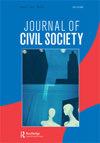Semi-civil society: A missing link in explaining the transformation of communist dictatorships?
IF 0.9
Q3 POLITICAL SCIENCE
引用次数: 0
Abstract
ABSTRACT Much has been written about civil society’s role in transforming communist regimes; however, scholars have largely ignored the officially sanctioned organizations. Yet, when political openings arise, official organizations evolve into ‘semi-civil society and play an important role in bringing down communist-led regimes. When a reformist regime begins opening up, semi-civil society turns to the regime and pressures it to reach make farther-reaching reforms, which can lead to a negotiated transition. When the regime is less open, semi-civil society turns to the opposition, which can help bring about an uprising. Semi-civil society by itself cannot bring down a regime or make it more pluralist, but it provides a missing link that has been absent from previous analyses of the collapse of communist regimes. This article applies these insights to a reformist Asian communist-ruled country: Vietnam (with reference to China). In such communist-ruled countries, semi-civil society is already making society more pluralist and we can it expect it to be a driving force for the further pluralization of society and possibly even its democratization. If these countries eventually democratize, semi-civil society will help them follow the Hungarian path to negotiated transitions rather than the Czechoslovak path to change through an uprising.半公民社会:解释共产主义独裁政权转变的缺失环节?
关于公民社会在共产主义政权转型中的作用,人们已经写了很多;然而,学者们在很大程度上忽略了官方认可的组织。然而,当政治开放出现时,官方组织演变成“半公民社会”,并在推翻共产党领导的政权方面发挥重要作用。当一个改革派政权开始开放时,半公民社会转向该政权,并向其施压,要求其进行更深入的改革,这可能导致谈判过渡。当政权不那么开放时,半公民社会就会转向反对派,这有助于引发起义。半公民社会本身不能推翻一个政权或使其更加多元化,但它提供了一个缺失的环节,这是以前对共产主义政权崩溃的分析所缺少的。本文将这些见解应用于一个改革的亚洲共产主义国家:越南(参考中国)。在这些共产主义统治的国家,半公民社会已经使社会更加多元化,我们可以期待它成为社会进一步多元化甚至可能民主化的推动力。如果这些国家最终实现民主化,半公民社会将帮助它们走匈牙利的道路,通过谈判实现过渡,而不是走捷克斯洛伐克的道路,通过起义实现变革。
本文章由计算机程序翻译,如有差异,请以英文原文为准。
求助全文
约1分钟内获得全文
求助全文

 求助内容:
求助内容: 应助结果提醒方式:
应助结果提醒方式:


